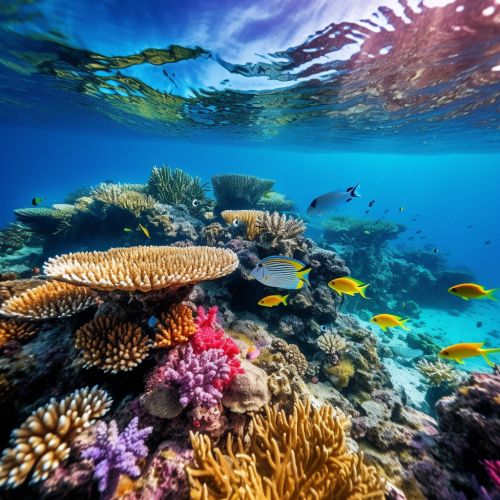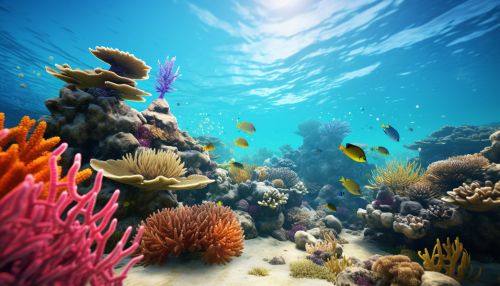Mechanisms of Coral Calcification Under Ocean Acidification
Introduction
Coral calcification is a biological process by which corals produce calcium carbonate to form their skeletons. This process is critical for the growth and survival of coral reefs, which are among the most diverse and productive ecosystems on Earth. However, ocean acidification, a result of increased carbon dioxide (CO2) emissions, poses a significant threat to this process and the health of coral reefs worldwide.


Coral Calcification Process
Coral calcification involves a complex interplay of biological and chemical processes. At the heart of these processes are the coral's symbiotic algae, known as zooxanthellae, which live within the coral's tissues. These algae photosynthesize, producing oxygen and other organic compounds that the coral uses for energy. In return, the coral provides the algae with a protected environment and compounds necessary for photosynthesis.
The calcification process begins when the coral absorbs calcium ions (Ca2+) and bicarbonate ions (HCO3-) from the surrounding seawater. These ions are transported to the site of calcification, where they combine to form calcium carbonate (CaCO3), the primary component of the coral's skeleton. This process is facilitated by an enzyme called carbonic anhydrase, which catalyzes the reaction between calcium and bicarbonate ions.
Ocean Acidification and Its Impact on Coral Calcification
Ocean acidification is a global environmental issue caused by the increase in atmospheric CO2 due to human activities such as burning fossil fuels and deforestation. When CO2 dissolves in seawater, it forms carbonic acid, which dissociates to release hydrogen ions (H+), thereby lowering the pH of the ocean and making it more acidic. This process also reduces the concentration of carbonate ions (CO3 2-), which are essential for the formation of calcium carbonate in coral calcification.
Research has shown that ocean acidification can have a detrimental effect on coral calcification. The decrease in pH can inhibit the activity of carbonic anhydrase, slowing down the calcification process. Additionally, the reduction in carbonate ion concentration makes it more difficult for corals to form calcium carbonate, leading to weaker and more brittle skeletons. This can result in slower growth rates and increased susceptibility to physical damage and disease.
Mechanisms of Coral Calcification Under Ocean Acidification
Despite the challenges posed by ocean acidification, some corals have shown remarkable resilience. This resilience is thought to be due to a variety of mechanisms that allow corals to continue calcifying under acidic conditions.
One such mechanism is the ability of corals to regulate the pH at the site of calcification. Studies have found that corals can actively pump hydrogen ions out of the calcifying fluid, thereby increasing its pH and facilitating the formation of calcium carbonate. This process requires energy, which is provided by the photosynthetic activity of the zooxanthellae.
Another mechanism is the use of alternative sources of carbonate ions. Some corals can use bicarbonate ions instead of carbonate ions for calcification. This ability could be particularly beneficial under ocean acidification, as the concentration of bicarbonate ions in seawater is less affected by changes in pH.
Conclusion
Understanding the mechanisms of coral calcification under ocean acidification is crucial for predicting the future of coral reefs in a changing ocean. While some corals have shown resilience to acidification, the overall impact of this process on coral reefs is still largely negative. Continued research in this field is necessary to develop strategies for the conservation and restoration of coral reefs.
